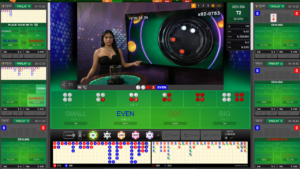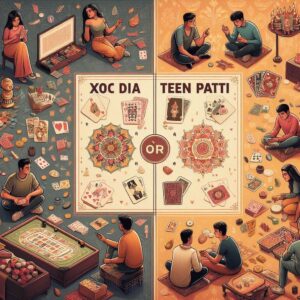AI in Xoc Dia: Revolutionizing Traditional Vietnamese Gambling

Xoc Dia, a traditional Vietnamese gambling game, has been a part of the country’s cultural fabric for generations. This simple yet exciting game involves players betting on the outcome of four coins tossed in a covered bowl. As technology advances, AI in Xoc Dia is becoming increasingly prevalent, transforming the way this age-old game is played and experienced.
The integration of AI in this game represents a significant shift in the gambling landscape, blending tradition with cutting-edge technology. This article explores how AI is changing the game, its current applications, benefits, challenges, and future prospects.
The Rise of AI in Gaming
Before delving into the specifics of AI in this Vietnamese game, it’s essential to understand the broader context of AI in gaming. Artificial Intelligence has made significant strides in various game genres, from chess to complex strategy games. Some notable examples include:
- DeepMind’s AlphaGo, which defeated world champion Go players
- IBM’s Deep Blue, which beat chess grandmaster Garry Kasparov
- OpenAI’s bot, which outperformed professional players in Dota 2
These achievements demonstrate the potential of AI to excel in games that require strategic thinking, pattern recognition, and decision-making under uncertainty – skills that are highly relevant to Xoc Dia.
AI in Xoc Dia: Current Applications
The application of AI in Xoc Dia is still in its early stages, but several key areas are already seeing significant developments:
1. Game Analysis and Strategy Optimization
AI algorithms can analyze vast amounts of Xoc Dia game data to identify patterns and optimal strategies. This application of AI helps players and casinos alike to improve their decision-making processes.
2. Fraud Detection
AI-powered systems can monitor games in real-time to detect unusual betting patterns or player behaviors that may indicate cheating or collusion. This enhances the integrity of Xoc Dia games, especially in online platforms.
3. Player Behavior Prediction
By analyzing historical data and current game states, AI can predict player behaviors and preferences. This information is valuable for casinos in tailoring their offerings and marketing strategies.
4. Virtual Dealers and Game Hosts
Some online Xoc Dia platforms are experimenting with AI-powered virtual dealers or game hosts. These AI entities can manage games, interact with players, and provide a more immersive experience.
Benefits of AI in Xoc Dia
The integration of AI in Xoc Dia brings several advantages to both players and game operators:
- Enhanced Game Fairness: AI systems can ensure that games are conducted fairly and randomly, reducing the potential for human error or manipulation.
- Improved Player Experience: AI-powered personalization can tailor the gaming experience to individual preferences, making Xoc Dia more engaging and enjoyable.
- Efficient Operations: For casinos and online platforms, AI can streamline operations, reduce costs, and improve overall efficiency.
- Advanced Analytics: AI provides deep insights into game dynamics and player behaviors, allowing for data-driven decision-making and strategy development.
- Accessibility: AI-powered online platforms make this game more accessible to a global audience, preserving and spreading this traditional Vietnamese game.
Challenges and Concerns
Despite its potential benefits, the implementation of AI in games also face several challenges:
1. Ethical Considerations
The use of AI in gambling raises ethical questions about fairness, addiction, and responsible gaming. It’s crucial to ensure that AI in games are used ethically and doesn’t exploit vulnerable players.
2. Technical Challenges
Developing robust AI systems for a game with cultural nuances like Xoc Dia presents technical challenges. Ensuring that AI can understand and respect the game’s cultural context is essential.
3. Player Trust
Some players may be skeptical of AI-powered systems, fearing that they could be manipulated or biased. Building trust in AI technologies is crucial for their widespread adoption in Xoc Dia.
4. Regulatory Hurdles
The use of AI in games may face regulatory challenges, as gambling laws in many jurisdictions may not have caught up with these technological advancements.
Future Prospects of AI in Xoc Dia
Looking ahead, the future of AI in Xoc Dia appears promising, with several potential developments on the horizon:
- Advanced AI Players: We may see the development of AI systems capable of playing Xoc Dia at a high level, offering challenging opponents for human players.
- Immersive AR/VR Experiences: AI could power more immersive Augmented Reality (AR) or Virtual Reality (VR) Xoc Dia experiences, bringing the traditional game to life in new ways.
- Predictive Analytics: More sophisticated AI models could offer highly accurate predictions of game outcomes, potentially changing betting strategies and game dynamics.
- Personalized Learning: AI could provide personalized coaching and learning experiences for Xoc Dia players, helping them improve their skills.
- Cross-Platform Integration: AI might facilitate seamless integration of Xoc Dia across various gaming platforms, from mobile devices to traditional casinos.
Regulatory Implications
The introduction of AI in this game presents new challenges for regulators. Key considerations include:
- Fairness and Transparency: Ensuring that AI systems used in this game are fair, transparent, and auditable.
- Data Protection: Safeguarding player data collected and used by AI systems.
- Responsible Gaming: Developing guidelines for the use of AI in promoting responsible gaming practices.
- Cross-Border Regulations: Addressing the challenges of regulating AI in gaming platforms that operate across international borders.
Regulators will need to work closely with technology experts, game operators, and player advocacy groups to develop appropriate frameworks for AI in games.
Impact on Players and the Industry
The integration of AI is likely to have far-reaching effects on both players and the broader gambling industry:
For Players:
- More engaging and personalized gaming experiences
- Potentially fairer games with reduced human error
- Access to advanced analytics and strategy tools
- New challenges in adapting to AI-enhanced gameplay
For the Industry:
- Opportunities for innovation and new product development
- Potential for market expansion through online and mobile platforms
- Need for investment in AI technologies and expertise
- Challenges in adapting business models to incorporate AI
AI in Xoc Dia represents a fascinating intersection of tradition and technology. As AI continues to evolve, it has the potential to transform this traditional Vietnamese game, making it more accessible, engaging, and fair. However, this transformation also brings challenges that need to be carefully addressed.
The future of AI will depend on how well the technology can be integrated while respecting the game’s cultural heritage and addressing ethical concerns. As players, industry stakeholders, and regulators navigate this new landscape, the key will be to harness the benefits of AI while preserving the essence of what makes this game a beloved game.







